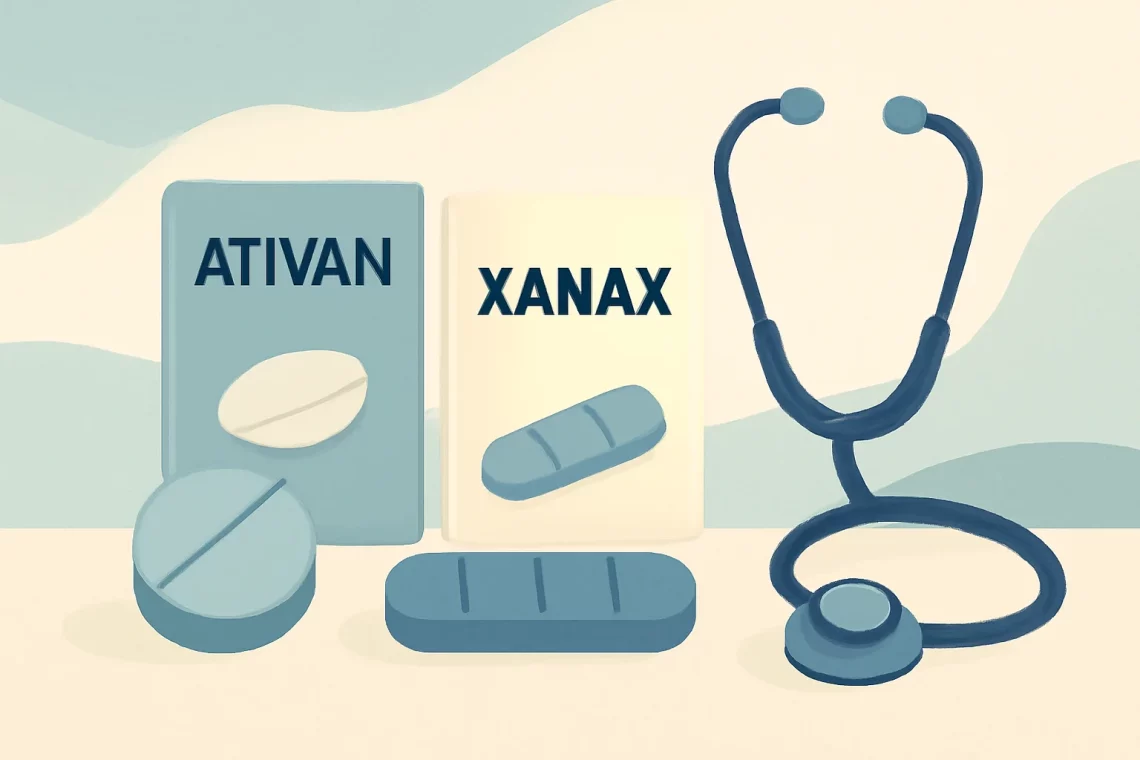-
Ativan vs Xanax: Understanding the Differences and Uses
Ativan and Xanax are two commonly prescribed medications that belong to a class of drugs known as benzodiazepines. These medications are primarily used for the treatment of anxiety disorders, panic attacks, and other related conditions. While both Ativan and Xanax share similar therapeutic effects, there are notable differences between the two that can influence a healthcare provider’s choice in prescribing one over the other. Understanding these differences, including their pharmacological properties, potential side effects, and the contexts in which they are most effective, is crucial for patients seeking relief from anxiety and related symptoms. As anxiety disorders become increasingly prevalent, the conversations surrounding the use of such medications have garnered…
-
Trazodone vs Mirtazapine: Which Antidepressant Is Right for You?
Trazodone and Mirtazapine are two medications commonly prescribed for the treatment of various mental health conditions, primarily depression and anxiety. Both of these medications have gained recognition for their effectiveness, yet they operate through distinct mechanisms in the brain and have different profiles of side effects. Understanding the nuances of each medication can be crucial for patients and healthcare providers alike when making informed treatment choices. Trazodone is classified as a serotonin antagonist and reuptake inhibitor (SARI), while Mirtazapine falls under the category of noradrenergic and specific serotonergic antidepressants (NaSSAs). Their differing modes of action influence not only their efficacy but also the types of side effects and interactions they…
-
Trazodone or Mirtazapine: Which Antidepressant is Right for You?
Trazodone and mirtazapine are two medications commonly prescribed for the treatment of depression and anxiety disorders. As mental health awareness has grown, so has the need for effective treatments. These medications belong to different classes of antidepressants and have unique mechanisms of action, side effects, and therapeutic uses. Understanding the differences and similarities between trazodone and mirtazapine can help individuals make informed decisions about their treatment options. Both medications are generally well-tolerated, but their efficacy can vary from person to person. Some patients may respond better to one medication than the other, and factors such as individual health history, other medications being taken, and potential interactions can influence this choice.…
-
Xanax vs Librium: Understanding the Differences and Uses
Xanax and Librium are two medications that fall under the category of anxiolytics, commonly prescribed to manage anxiety and related disorders. While both drugs serve a similar purpose, they possess distinct characteristics, mechanisms of action, and potential side effects. Understanding these differences can be crucial for patients and healthcare providers alike. The increasing prevalence of anxiety disorders in today’s fast-paced world has heightened the demand for effective treatment options. As such, a thorough examination of anxiety medications like Xanax and Librium is essential for informed decision-making. When discussing anxiolytics, it’s important to recognize that they interact with the brain’s neurotransmitters, particularly gamma-aminobutyric acid (GABA). This interaction can lead to a…
-
Lexapro vs Remeron: A Comprehensive Comparison of Antidepressants
The choice between medications for mental health can be daunting, especially when it comes to antidepressants. Two commonly prescribed options are Lexapro and Remeron. Both of these medications have distinct mechanisms of action, benefits, and side effects, making them suitable for different types of patients and conditions. Understanding the nuances of these drugs is essential not only for patients but also for healthcare providers who aim to offer personalized treatment plans. Antidepressants like Lexapro (escitalopram) and Remeron (mirtazapine) are often used to treat major depressive disorder and anxiety disorders. Each medication interacts with the brain’s neurotransmitters in different ways, influencing mood, sleep, and appetite. As mental health awareness increases, the…
-
Lexapro vs Zoloft: Choosing the Right Antidepressant for You
Depression and anxiety disorders are prevalent mental health issues that affect millions of people worldwide. As awareness of these conditions grows, so does the search for effective treatment options. Among the various pharmacological interventions available, selective serotonin reuptake inhibitors (SSRIs) are often prescribed due to their efficacy and relatively favorable side effect profiles. Two commonly prescribed SSRIs are Lexapro and Zoloft. While both medications are designed to alleviate symptoms of depression and anxiety, they differ in several key areas, including their mechanisms of action, side effects, and overall effectiveness. Understanding these differences can help individuals and healthcare providers make informed decisions regarding treatment options. This article delves into the characteristics,…
-
Clonazepam vs Librium: Key Differences and Uses Explained
Clonazepam and Librium are two medications that are commonly used to treat anxiety and other related disorders. Both belong to the class of drugs known as benzodiazepines, which work by affecting the central nervous system to produce a calming effect. Due to their similar classifications, many individuals often find themselves comparing these two medications when seeking relief from anxiety, panic disorders, or other conditions that require sedative effects. Understanding the nuances between Clonazepam and Librium can aid in making informed decisions about treatment options. Factors such as potency, duration of action, side effects, and the specific conditions each medication is prescribed for play a critical role in differentiating these drugs.…
-
Adderall vs Strattera: Choosing the Right ADHD Medication for You
Attention deficit hyperactivity disorder (ADHD) affects millions of individuals worldwide, leading to challenges in focusing, organizing, and managing daily tasks. As awareness around ADHD has expanded, so too have the options for treatment. Among the most commonly prescribed medications are Adderall and Strattera, both of which aim to alleviate the symptoms associated with ADHD. However, their mechanisms of action, efficacy, and side effects differ significantly, leading to debates among healthcare professionals, patients, and families regarding the best approach to treatment. The complexity of ADHD necessitates a nuanced understanding of these medications. Adderall, a stimulant medication, is often favored for its rapid action and immediate symptom relief, making it a popular…
-
Lexapro vs Luvox: Choosing the Right Antidepressant for You
The landscape of mental health treatment has evolved significantly over the years, providing individuals with various options to manage their conditions effectively. Among these options, selective serotonin reuptake inhibitors (SSRIs) have emerged as a popular choice for treating anxiety and depressive disorders. Two of the most commonly prescribed SSRIs are Lexapro and Luvox, both of which have established their efficacy in helping patients regain a sense of well-being. As mental health awareness continues to grow, understanding the differences and similarities between these medications becomes increasingly important for patients and healthcare providers alike. Choosing the right medication can be a daunting task, especially with the plethora of options available. Factors such…
-
Wellbutrin vs Viibryd: Comparing Effectiveness and Side Effects
In recent years, mental health has become a focal point for both healthcare professionals and the general public. With increasing awareness around conditions such as depression and anxiety, the search for effective treatment options has intensified. Among the various medications available, Wellbutrin and Viibryd have emerged as popular choices for managing symptoms associated with depression and anxiety disorders. These medications represent different classes of antidepressants, each with unique mechanisms of action, side effects, and benefits. Understanding the distinctions between Wellbutrin and Viibryd is crucial for patients and healthcare providers alike. The choice of medication can significantly affect a patient’s quality of life, highlighting the importance of informed decision-making in treatment…





































